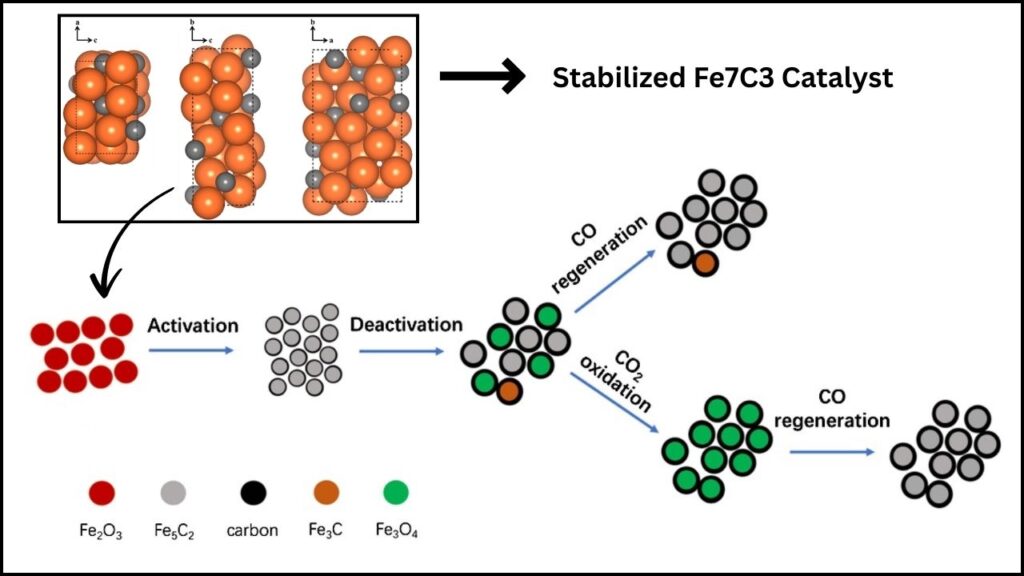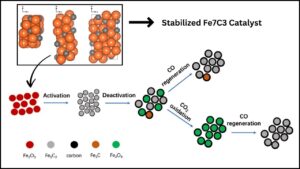Copper, a trace mineral often hidden in the background of nutrition discussions, is emerging as a critical player in brain health. Recent research highlights that moderate copper intake may contribute significantly to preserving cognitive function, memory, and mental agility, particularly in older adults. This article takes a deep dive into the biological importance of copper, reviews the latest scientific findings, and provides a practical, step-by-step guide to incorporating copper safely into your diet for optimal brain health.
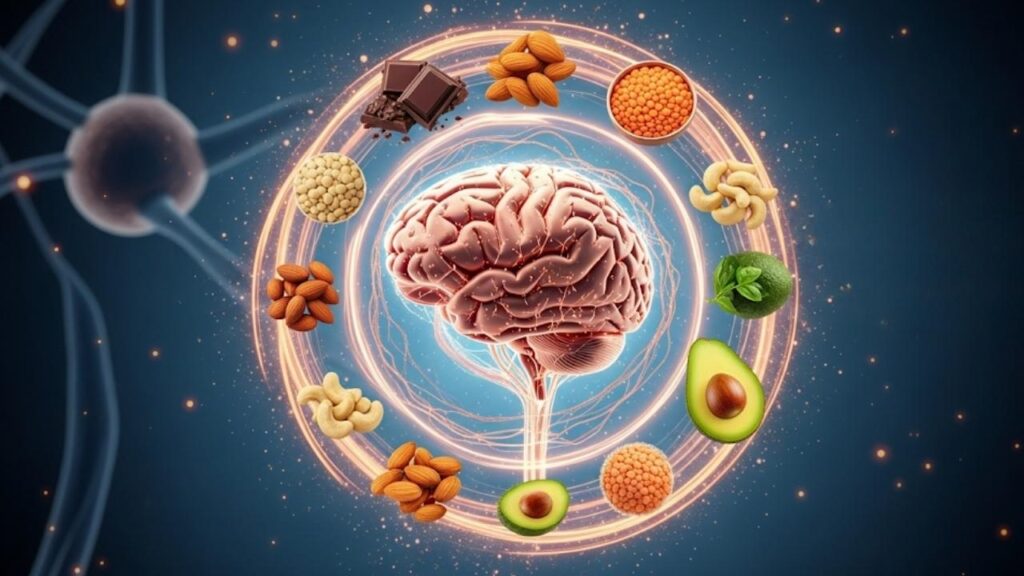
Table of Contents
Could Copper in Your Diet Protect Your Brain and Prevent Memory Loss?
| Key Aspect | Details |
|---|---|
| Biological Role | Copper is essential for energy metabolism, neurotransmitter synthesis, and antioxidant defense. |
| Optimal Intake for Cognition | 1.2 to 1.6 mg/day linked to improved cognition in older adults, above general RDA of 0.9 mg/day. |
| Cognitive Functions Supported | Attention, processing speed, executive function, verbal memory benefit from copper intake. |
| Population With Strongest Benefit | Stroke survivors showed notable cognitive improvements linked to copper consumption. |
| Risk of Excess Copper | High copper intake combined with saturated fats may promote oxidative stress, potentially harmful. |
| Rich Dietary Sources | Shellfish (especially oysters), nuts, seeds, dark chocolate, legumes, potatoes, whole grains. |
| Trustworthy Research | Recent U.S. study with 2,400+ participants; corroborated by mechanistic and longitudinal studies. |
| Authoritative Resource | National Institutes of Health – Copper Fact Sheet |
Copper, though required in trace amounts, plays an outsized role in supporting brain function through energy metabolism, neurotransmitter synthesis, and antioxidant defense. Recent research provides encouraging evidence that moderate dietary copper intake—about 1.2 to 1.6 mg per day—may help preserve cognitive abilities and protect memory in older adults, particularly in people recovering from stroke.
However, balance is key. Both deficiency and excess copper can impair brain health, underscoring the importance of consuming copper through a diverse, balanced diet rich in natural food sources rather than high-dose supplements.
Those interested in improving or maintaining brain health should take an integrated approach that includes copper alongside healthy lifestyle factors such as cardiovascular care, physical activity, and mental stimulation.
Why Copper Is So Important for Your Brain
Copper is a micronutrient, meaning the body requires it in very small amounts—but these small amounts have vital functions, particularly in the brain:
1. Powering Brain Cells Through Energy Metabolism
Your brain is a highly energy-demanding organ, using about 20% of your body’s total energy despite its small size. Copper acts as a cofactor for several enzymes in the mitochondria, the “powerhouses” of brain cells. Without adequate copper:
- Energy production falters
- Neurons cannot maintain their function effectively
- Cognition and memory can decline
Enzymes like cytochrome c oxidase, integral to the final steps of cellular respiration, rely on copper to generate ATP, the fundamental energy molecule.
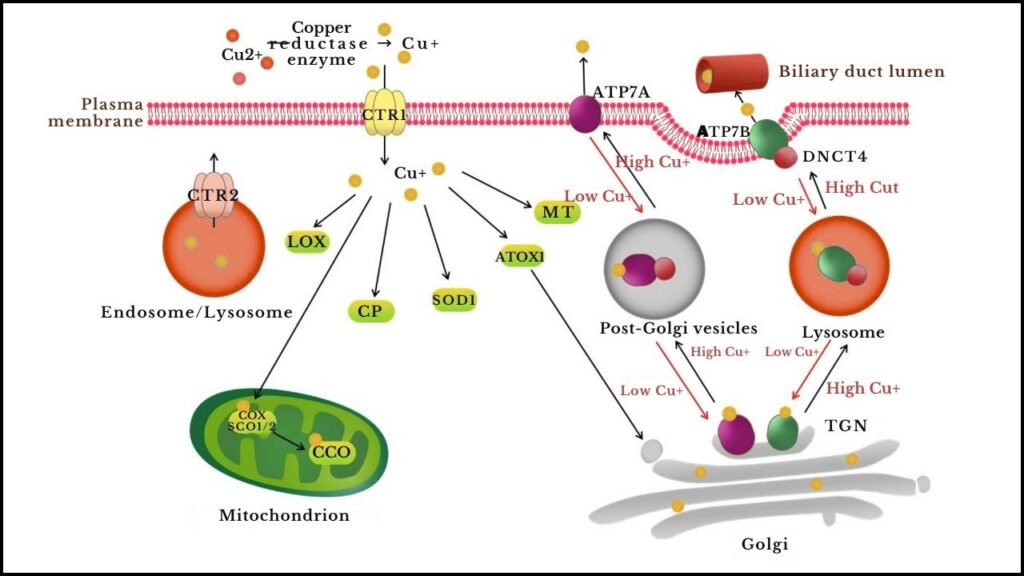
2. Facilitating Neurotransmitter Production and Communication
Copper helps enzymes involved in synthesizing neurotransmitters—chemical messengers such as dopamine, norepinephrine, and serotonin. These regulate mood, alertness, memory encoding, and many cognitive processes. An imbalance in copper can affect:
- Neurotransmitter balance
- Chemical signaling between neurons
- Cognitive clarity and emotional regulation
3. Defending Neurons Against Oxidative Stress
Copper forms the active center of superoxide dismutase (SOD1), a critical antioxidant enzyme in the brain that neutralizes reactive oxygen species, which are unstable molecules that cause oxidative damage to cells.
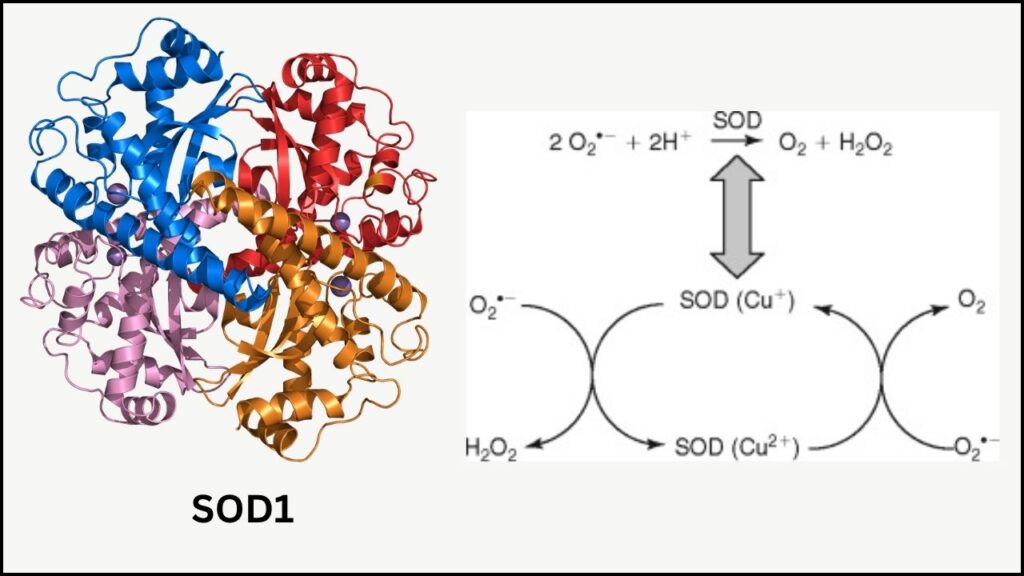
Oxidative stress is a major driver of aging and neurodegenerative diseases like Alzheimer’s and Parkinson’s. Ensuring sufficient copper supports your brain’s defense system, potentially slowing cognitive decline.
What Does the Recent Research Show?
A groundbreaking study published in Nature Scientific Reports (July 2025) investigated the impact of copper on cognitive performance in a nationally representative sample of 2,400+ older Americans aged ~69 on average. Participants took detailed neuropsychological tests assessing:
- Attention and processing speed
- Executive function (planning, mental flexibility)
- Verbal memory and fluency
Key Research Findings
- Optimal copper intake range: 1.2 to 1.6 mg/day. Participants with copper intake in this range scored consistently higher on cognitive tests. For example:
- Digit Symbol Substitution Test (processing speed): maximum improvement at ~1.63 mg/day
- Animal Fluency Test (executive function): peak effect near 1.42 mg/day
- Global cognitive measures: optimal benefit around 1.22 mg/day
- Stroke survivors exhibited the strongest positive correlation. This is notable because stroke can cause oxidative damage and disrupt memory circuits – copper’s antioxidant properties and role in neural repair may be protective.
- A typical nutrient “U-shaped curve.” Cognition improved up to moderate copper intake levels but plateaued beyond 1.6 mg/day. This suggests too much copper offers no additional benefit and could potentially be harmful.
- Confounding lifestyle factors. Those consuming adequate copper generally had healthier lifestyles, higher socioeconomic status, and fewer vascular risk factors such as smoking or hypertension. This complicates interpretation but does not diminish copper’s potential role.
Understanding Recommended Copper Intake and Safety
Current Dietary Recommendations
The United States Food and Nutrition Board/EAR (Estimated Average Requirement) and RDA (Recommended Dietary Allowance) define:
| Age / Group | RDA for Copper (mg/day) |
|---|---|
| Adults (19+) | 0.9 mg |
| Pregnant women | 1.0 mg |
| Breastfeeding women | 1.3 mg |
The recent cognitive research suggests that older adults’ ideal intake for brain health may be slightly higher (1.2–1.6 mg/day). However, these findings are preliminary and should be balanced with established RDA values and safety considerations.
Risks of Excess Copper Intake
Too much copper can occasionally be:
- Neurotoxic: High levels encourage the formation of harmful reactive oxygen species.
- Zinc imbalance: Excess copper can interfere with zinc absorption, which is also essential for brain function.
- Toxicity and Metal Overload Disorders: Rare genetic conditions like Wilson’s disease cause copper accumulation in tissues and brain damage.
- Diet Context Matters: Copper paired with diets high in saturated fats might exacerbate oxidative damage.
Because copper is highly bioactive, supplementation without medical supervision is not advised.
Copper-Rich Foods: Nature’s Brain Boosters
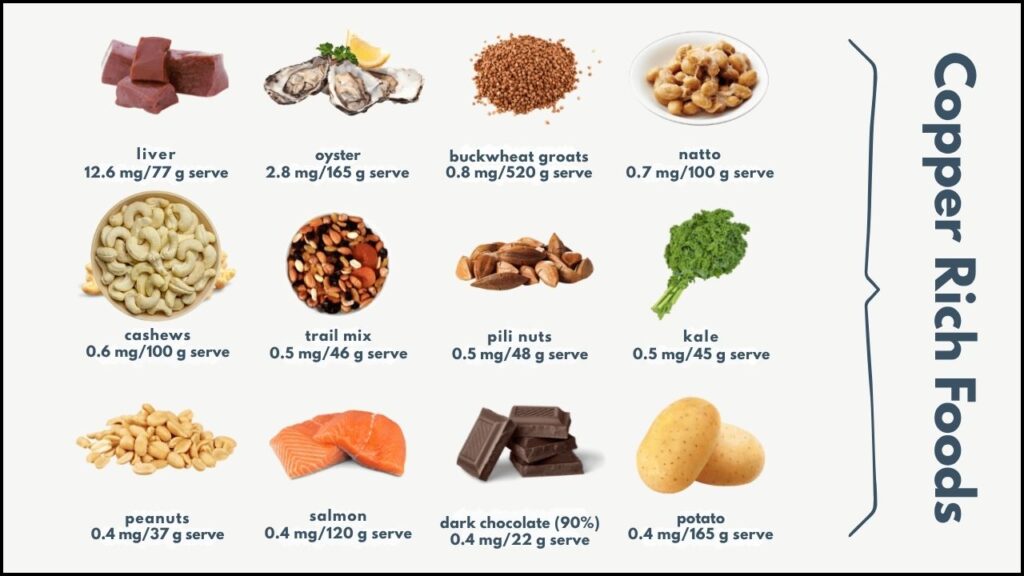
You can maintain ideal copper status naturally with a varied diet. Here are some of the richest sources with approximate copper content per serving:
| Food | Approximate Copper Content | Notes |
|---|---|---|
| Oysters (3 oz) | ~4.8 mg | Among richest known food sources |
| Crab (3 oz) | ~1.3 mg | Highly bioavailable copper |
| Cashew Nuts (1 oz) | ~0.62 mg | Plant-based source, also rich in healthy fats |
| Sunflower Seeds (1 oz) | ~0.52 mg | Contains other antioxidants |
| Dark Chocolate (1 oz, 70-85%) | ~0.5 mg | Adds antioxidants alongside copper |
| Lentils, cooked (1 cup) | ~0.49 mg | High in fiber and protein |
| Potatoes, baked (1 medium) | ~0.3 mg | Widely available staple |
| Mushrooms (1 cup, cooked) | ~0.3 mg | Diverse micronutrient profile |
Incorporating several of these foods multiple times a week can help you meet or exceed the optimal copper intake for brain health.
Practical Guide: Safely Incorporating Copper to Boost Brain Health
Step 1: Evaluate Your Eating Habits
Use a food diary or nutrition apps to track your copper intake over several days. Many apps and food databases include copper content for common foods.
Step 2: Aim for Balanced, Moderate Intake (1.2–1.6 mg/day for Older Adults)
Prioritize food sources over supplements. Small adjustments such as adding a handful of nuts or a serving of legumes daily can increase copper intake.
Step 3: Minimize Factors That May Counteract Benefits
- Limit saturated fat intake, which can worsen copper-associated oxidative stress.
- Avoid smoking and excessive alcohol consumption.
- Manage cardiovascular risk factors, which strongly affect cognitive health.
Step 4: Consult Healthcare Professionals Before Supplementing
Testing for copper status through blood tests might be warranted if:
- You have symptoms of deficiency or toxicity (fatigue, neurological symptoms).
- You consider copper supplements or have medical conditions affecting mineral metabolism.
Step 5: Adopt a Holistic Lifestyle for Brain Health
Combine diet with:
- Regular physical activity
- Adequate sleep
- Social engagement
- Mental stimulation
- Cardiovascular health management
Tech Meets Textiles: Smart Fabrics That Monitor Health and Power Devices
FAQs About Could Copper in Your Diet Protect Your Brain and Prevent Memory Loss?
Q1: Does copper supplementation improve memory immediately?
No. Copper supplementation should be approached cautiously and is not an immediate fix. The benefits appear with moderate, consistent dietary intake.
Q2: Can eating too much copper cause memory loss?
Excessive copper, especially alongside poor diet quality, may increase oxidative stress, which negatively affects brain health.
Q3: Is copper deficiency common?
Deficiency is relatively rare in well-nourished populations but can occur with malabsorption or excessive zinc intake.
Q4: Are copper levels routinely tested?
Not usually, unless clinically indicated. Testing includes serum copper and ceruloplasmin.
Q5: How can stroke survivors safely increase copper intake?
With medical advice, including copper-rich healthy foods is encouraged, as recent studies show cognitive benefits in this group.







